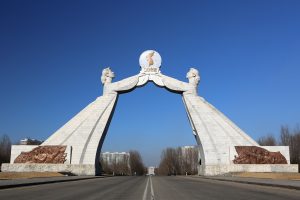Earlier this year, North Korea fired artillery shells near the western sea boundary with South Korea, raising military tensions on the Korean Peninsula. On January 14, North Korea fired a new solid-fuel intermediate-range missile tipped with a hypersonic weapon.
Considering Pyongyang’s firm vow to strengthen its nuclear capabilities in the wake of the failed Hanoi summit between then-U.S. President Donald Trump and Kim Jong Un in February 2019, there is no reason to be surprised by the North’s missile launches. However, the noteworthy part is Pyongyang’s recent rhetoric against South Korea.
Kim Jong Un, the autocratic leader of North Korea, called South Korea his country’s “principal enemy.” In a speech to the Supreme People’s Assembly on January 15, he also said the constitution should be amended to call South Korea the “primary foe,” according to a report by the North’s Korean Central News Agency on January 16.
Kim Yo Jong, the powerful sister of Kim Jong Un who is the state’s main voice on inter-Korean relations, also recently mocked Seoul’s policy on Pyongyang. She sarcastically thanked Seoul for providing Pyongyang with reasons to beef up its missile capabilities.
While showing off his hostile stance on South Korea, Kim Jong Un clearly stated that South Korea must not be considered as a partner for reconciliation or unification in a key ruling party meeting held in late December 2023.
Following his remarks, North Korea shut down propaganda sites such as Uriminzokkiri, Arirang Meari, and Ryomyong, which were specifically aimed at spreading propaganda information in South Korea. Government agencies that were tasked with handling relations with South Korea – such as the Committee for the Peaceful Reunification of the Country and the Mount Kumgang International Tourism Administration – have also been abolished, according to the North’s state media on January 16.
In light of Kim and his sister’s remarks, and Pyongyang’s following measures, North Korea appears to have made a choice to be the Democratic People’s Republic of Korea (DPRK), not North Korea. In other words, Kim seems to have concluded that seeking reconciliation or unification with South Korea is no longer a possible mission to accomplish. For him, strengthening ties with Russia and China in the region is a more effective means to confront the rising leverage of the United States and South Korea in the long run, as proved by the North’s Foreign Minister Choe Su Hui’s visit to Moscow on January 15 to meet her counterpart, Sergei Lavrov.
Experts in Seoul and Washington showed deep concern about Pyongyang’s recent moves. Some U.S. experts raised the possibility of Kim using his nuclear arsenal as a military solution against South Korea.
In the absence of inter-Korean dialogue and North Korea-U.S. nuclear talks, it could be reasonable to speculate about a worst-case scenario on the Korean Peninsula. However, the measures taken by Pyongyang to clearly define the two Koreas as two different countries that cannot be unified could lead to some unexpected results in future negotiations.
According to a poll published by the Peaceful Unification Advisory Council, a presidential consultative body in South Korea, 73.7 percent of the respondents said unification with the North is necessary. However, more than half of the respondents supported the idea of the South and the North being two countries in which Koreans can visit freely, while only 28.5 percent supported a single sovereign state on the Korean Peninsula.
The poll strongly suggests that even Koreans who are supportive of “unification” define the term to mean far less than a formal merging of governments. If South Koreans can travel to and spend their vacations in the North, that may be enough to satisfy the yearning for “unification.”
If both governments are willing to abandon the idea of formal unification, that could be the catalyst for a permanently peaceful Korean Peninsula with no nuclear weapons. Seoul and Pyongyang would be able to discuss how to end the 1950-53 Korean War more smoothly, with the clear cooperation of Washington and Beijing. Also, it could provide more effective momentum for Pyongyang and Washington to work on denuclearization, as North Korea could be perceived as a one different country on the Korean Peninsula that can work with the international community.
Due to Kim’s deep mistrust that Seoul is seeking the collapse of his regime and pursuing unification by absorption, there will be countless steps for Seoul to take to coexist with Pyongyang peacefully on the Korean Peninsula, which South Koreans hope for. Rather than emphasizing that he will punish North Korea multiple times as hard if provoked, President Yoon Suk-yeol should recalibrate his policy on North Korea to reactivate diplomacy and halt verbal clashes with Pyongyang.
































